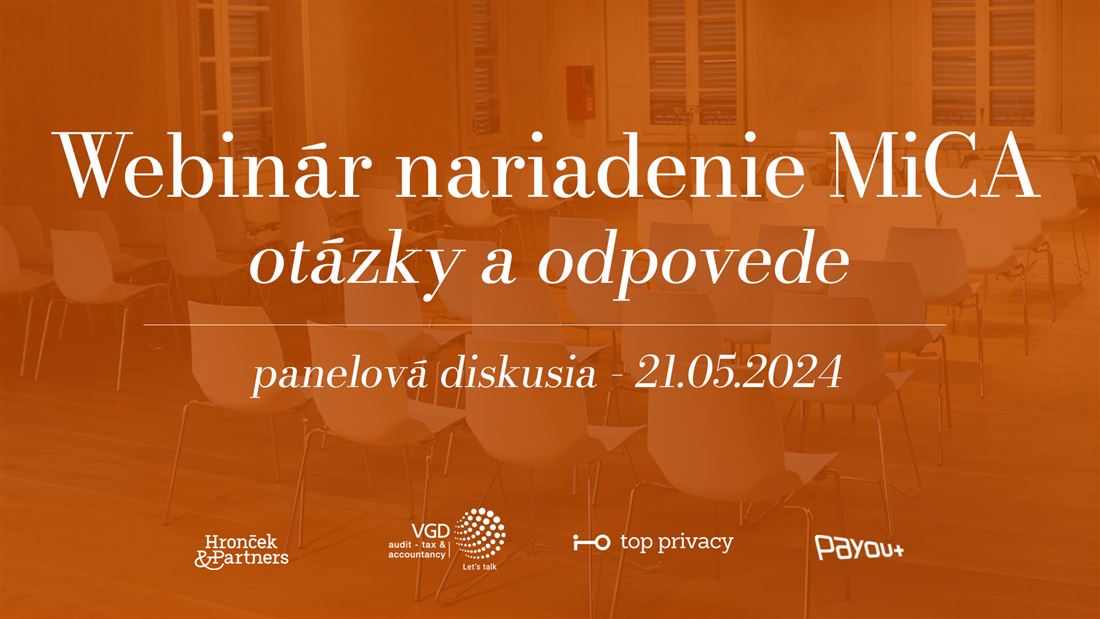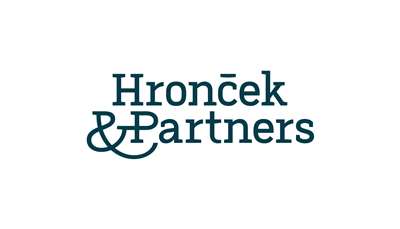
Does the law also apply to PFA intermediaries in the credit, deposit, and insurance sectors?
Answer: Michaela Mokrá, Legal Associate, Hronček & Partners s.r.o.
The MiCA Regulation applies to the following cryptoasset services:
- custody and management of crypto assets on behalf of clients – the safekeeping or control of crypto assets or means of access to such crypto assets on behalf of clients, where applicable in the form of private cryptographic keys;
- operating a trading platform for crypto assets – managing one or more multilateral systems that connect or facilitate the connection of multiple third parties to buy and sell crypto assets in the system and in accordance with its rules in a way that results in a contract, either by exchanging crypto assets for financial resources or by exchanging crypto assets for other crypto assets;
- exchange of crypto assets for financial resources – is the conclusion of purchase or sale contracts relating to crypto assets with clients for financial resources using own capital;
- exchange of crypto assets for other crypto assets – is the conclusion of purchase or sale contracts relating to crypto assets with clients for other crypto assets using own capital;
- executing orders relating to crypto assets on behalf of clients – entering into contracts on behalf of clients for the purchase or sale of one or more crypto assets or subscribing on behalf of clients for one or more crypto assets, and includes entering into contracts for the sale of crypto assets at the moment of their publicoffer or acceptance for trading;
- placing crypto assets – placing crypto assets on the market for buyers, on behalf of or for the account of the person offering the crypto assets or a party related to the person offering the crypto assets;
- receiving and transmitting orders relating to crypto assets on behalf of clients – is the acceptance of an order to buy or sell one or more crypto assets or to subscribe for one or more crypto assets from a person and the transmission of that order to a third party for execution;
- providing advice on crypto assets – offering, providing or agreeing to provide personalized recommendations to a client, either at the client's request or at the initiative of the CASP providing the advice, regarding one or more transactions involving crypto assets or the use of crypto asset services;
- providing cryptoasset portfolio management – managing portfolios in accordance with the authorizations granted by clients, at the discretion of individual clients, where those portfolios contain one or more cryptoassets;
- provision of cryptoasset transfer services on behalf of clients – the provision of services for the transfer of cryptoassets on behalf of a natural or legal person from one address or account in a distributed transaction database to another address or account in a distributed transaction database.
Financial intermediation and financial advice are regulated by Act No. 186/2009 Coll. on financial intermediation and financial advice and on amendments to certain acts, as amended (hereinafter referred to as "Act No. 186/2009 Coll.").
The answer to this question is not affected by the sectors in which financial intermediation and financial advisory services are provided, as crypto-asset services do not fall within the definition of financial services within the meaning of Act No. 186/2009 Coll. However, a business entity that is a financial agent or financial advisor may also carry out other business activities, as the subject of its activities regulated by Act No. 186/2009 Coll. is not exclusive in nature.
Therefore, if a financial agent or financial advisor currently provides any of the cryptoasset services (e.g. providing advice on crypto assets, receiving and transmitting orders relating to crypto assets on behalf of clients, managing crypto asset portfolios), it does not do so under Act No. 186/2009 Coll., but performs this as an unregulated activity that is not supervised by the NBS.
However, from 30 December 2024, pursuant to Article 59 et seq. of the MiCA Regulation, crypto-asset services may only be provided by:
- crypto-asset service providers that have been granted authorisation by the competent authority to provide crypto-asset services,
- certain types of financial institutions based on compliance with notification rules.
If a financial agent wishes to continue performing activities that meet the criteria for the provision of crypto-asset services after 30 December 2024, it must apply to the NBS for a license to perform one of the crypto-asset services.
As part of the license application, does the entity applying for the license have to have a bank account in the country where it is applying for the license? In other words, if I am from Slovakia, do I have to have a bank account in Slovakia?
Answer: Michaela Mokrá, Legal Associate, Hronček & Partners s.r.o.
In the licensing procedure, an applicant for a license to provide crypto-asset services must demonstrate that it has fulfilled the conditions set out in Article 70(1) and (3) of MiCA by taking appropriate measures to protect the property rights of clients.
According to the draft regulatory technical standards specifying certain requirements of MiCA (ESMA18-72330276-1634), the applicant must, among other things, provide a detailed description of its policies and procedures for separating crypto assets and client funds, including how it ensures that client funds will be held in an account separate from the applicant's accounts. The description of the procedures for separating client funds must therefore include information on the bank accounts that the future crypto asset service provider will maintain for this purpose. The applicant must also submit evidence demonstrating the separation of client funds from its own accounts, such as a contract concluded with a financial institution for the opening of a bank account.
However, neither the MiCA Regulation itself nor the draft delegated regulations impose such a requirement on crypto-asset service providers to have this account opened by a financial institution in the same country as the place where the application for authorization to provide crypto-asset services is submitted. It is therefore possible for an applicant to use the services of financial institutions across borders (including bank account or payment institution account services) as long as it can demonstrate the separation of funds.
Taxation of crypto assets – amendment: Will the value of crypto assets always have to be revalued at the end of the year at market price and income tax paid accordingly?
Answer: Róbert Kalmár, Tax Manager, VGD SLOVAKIA s. r. o.
Good afternoon
Allow me to answer your question regarding the revaluation of crypto assets based on your request for additional information.
Based on an analysis of the proposed consolidated text of the Act on Certain Obligations and Rights in the Field of Cryptoassets and the amendment to the Accounting Act, there is no change in the accounting treatment of cryptoassets. This means that even after the amendment to the Act, virtual currency will be valued only on the date of the accounting transaction, i.e. at the time of purchase, sale, exchange, etc.
The amendment to the Act focuses primarily on clarifying the definition of crypto assets and introducing a new registration obligation for persons engaged in crypto asset mining. The taxation of crypto assets remains essentially unchanged, with the exception of some technical adjustments.
Therefore, even after the amendment to the law, it will not be necessary to revalue crypto assets at the end of the year at market price and subsequently tax the difference between the acquisition price and the market price.
I hope this information is useful to you. Please do not hesitate to contact me if you have any further questions.
